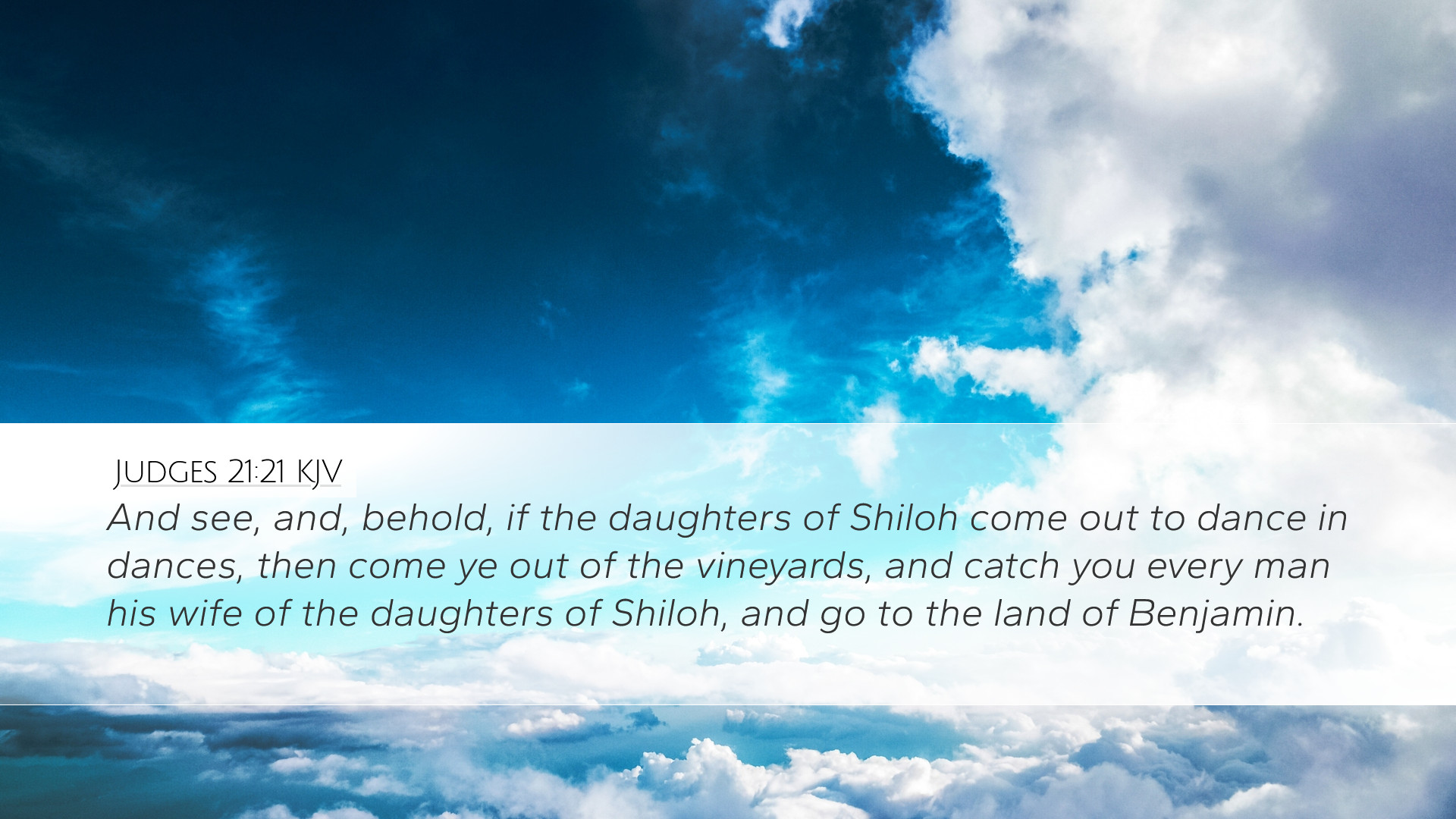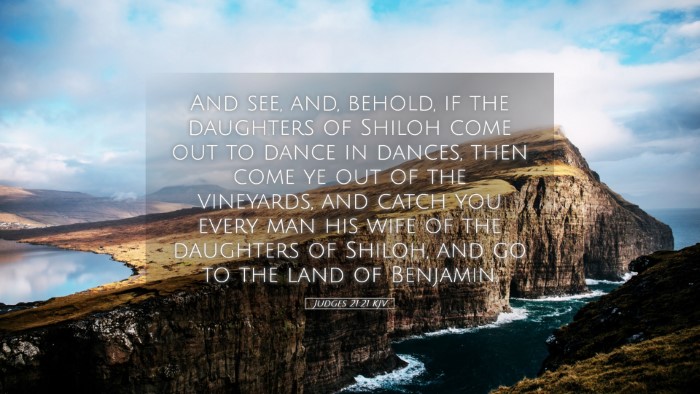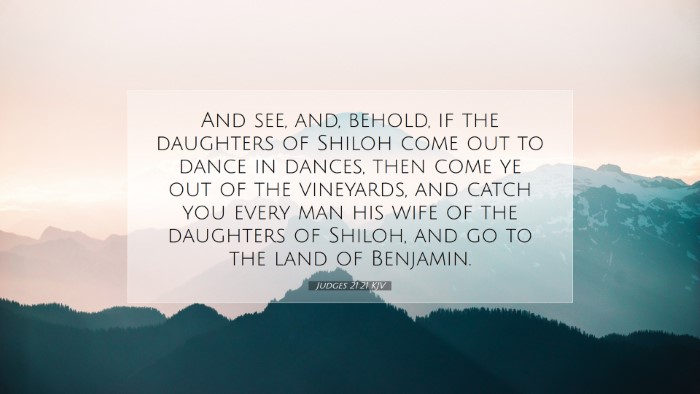Commentary on Judges 21:21
Verse Text: "And see, and behold, if the daughters of Shiloh come out to dance in dances, then come ye out of the vineyards, and catch you every man his wife of the daughters of Shiloh, and go to the land of Benjamin."
This verse occurs in the concluding chapters of the Book of Judges, amidst the tragic circumstances following the civil conflict between the tribe of Benjamin and the other tribes of Israel. The context is essential for understanding the implications of this directive and the moral questions it raises.
Contextual Overview
The events leading to this verse involve a severe conflict where the tribe of Benjamin was nearly exterminated due to their refusal to deliver up the perpetrators of a grievous sin against a Levite's concubine (Judges 19). After a near-total annihilation of Benjamin, the remaining people are faced with the loss of their women and are concerned that their tribe will become extinct.
Thus, the elders of Israel devise a plan to provide wives for the surviving Benjaminites by directing them to abduct daughters from Shiloh during a celebratory event (Judges 21:19-23). This grave solution raises significant ethical questions and indicates the desperate measures taken in light of national calamity.
Commentary Insights
Matthew Henry's Commentary
Matthew Henry, in his renowned commentary, emphasizes the desperation of the Israelites and the dire situation they faced. He notes that the plan, while seemingly pragmatic, reflects the broader moral decay present during the time of the judges. He suggests that the actions stemming from this verse highlight the recklessness and the loss of godly guidance among the people.
Henry also points out that the Levite's concubine's death led to irreversible consequences, suggesting that sin frequently culminates in further sin, creating a cycle of violence and moral compromise. The choice to capture wives through deception is indicative of that atmosphere of lawlessness where moral restraints had completely eroded.
Albert Barnes' Notes
Albert Barnes provides a critical examination of the instructions given in Judges 21:21. He indicates that the plan involved a calculated ambiguity, as the daughters of Shiloh were comparatively innocent in their role. Barnes underscores the difficulty of justifying such actions, noting the inherent tension between cultural practices and divine expectations of morality.
Furthermore, Barnes highlights the spiritual vacuum present in Israel at this time, where the lack of a king led to every man doing what was right in his own eyes (Judges 21:25). This anarchic state of society illustrates that human autonomy, unhinged from divine standards, often justifies immoral and unethical conduct.
Adam Clarke's Commentary
Adam Clarke takes a more nuanced approach, noting the cultural context surrounding the events of this verse. He emphasizes that while the act of seizing wives was framed as a "solution," it only served to cover up the deeper issues of morality and justice that were prevalent at the time. Clarke argues that the licentiousness evident in the Israelite community raises clear concerns for contemporary audiences regarding the legitimacy of social norms that contradict divine commandments.
Further, Clarke suggests that the resultant marriages were fraught with complexities, as they began under duress and deceit rather than under the covenant of love and commitment. This resonates with today’s understanding of the implications of forced relationships, emphasizing the need for understanding the nature of true covenant relationships according to God’s design.
Moral and Theological Implications
The actions taken in Judges 21:21 and the circumstances leading to them serve as a cautionary tale about sin and its far-reaching effects on individual and corporate morality. The desperation shown by the Israelites reflects a society that is overwhelmed by its own failures, leading to further moral decline as they ignore God's directives through a lack of leadership.
Reflection for Today's Believers
For pastors and theologians, the implications of this passage are significant. It raises urgent questions about the nature of human intervention in the face of calamity. Are we, in our attempts to address societal issues, perpetuating cycles of sin that lead to further justification of immoral practices?
Today’s church must grapple with the tension between societal norms and biblical truths, ensuring that decisions are governed by God’s word rather than human wisdom. Each believer is called to submit to God’s authority and reflect on the moral legislation He lays out, contrasting the chaos and anarchy seen during the Judges period.
Conclusion
Judges 21:21 encapsulates the tragic results of a society that has severed ties with divine guidance. Through the insights gained from public domain commentaries, it is clear that while the Israelites were driven by a desire to preserve their tribe, their means of doing so compromised the very fabric of God's intended morality. Reflecting on this passage offers today’s church a poignant reminder to seek divine wisdom and uphold God’s standards, even in the face of complex societal challenges.


